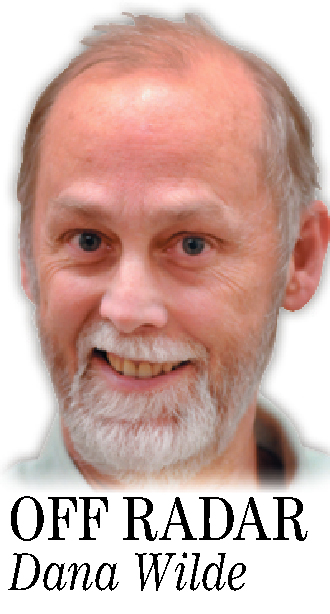“Li Bai Rides a Celestial Dolphin Home” might be my favorite collection of Tom Sexton’s skillful verse. The former Alaska poet laureate who spends every other winter in Eastport has a dozen published books, which seem to get richer as they mount up. “For the Sake of the Light” was a kind of greatest hits selection in 2009, and “I Think Again of Those Ancient Chinese Poets” in 2011 and “A Ladder of Cranes” in 2015 expanded the horizons, if that was possible.
The new collection builds on Sexton’s ability to evoke layers within layers of inner and outer experience in remarkably lucid, plain-spoken phrasing. The book contains four sections of poems, three of them on familiar subjects. One is the haunting quality of the natural world; “Christmas Wolves,” for example, begins:
Close enough to the city that we could hear
traffic, three wolves, motionless, like stone,
watched as we entered a small clearing.
Another, tiny section of two poems scrutinizes two photographs taken of a Russian church in the 19th century, and then a third perennial subject for Sexton is the supernaturally long drive between New England and Alaska (“West of Rousses Point, New York,” “Crossing the Prairies”) that he and his wife, Sharyn, have made over and over for decades, and even more often since they bought the house in Eastport.
Anyway, a fourth battery of lyrics in this collection differs from the more familiar others. It comprises a dreamlike narrative in which the eighth-century Chinese poet Li Bai finds his way home from the cabin in Denali National Park where Sexton spent a few weeks as writer-in-residence. A sense of Li Bai’s presence, in translation and otherwise, has haunted Sexton for years, it seems, and during the stay at Denali, he soon realized he was going to have to find a way to send Li Bai home. The 15 eight-line lyrics with a coda in the “Under Heaven’s River” section depict its particulars.
Li Bai, with what seems like a nod to Native American storytelling motifs, converses with helpful, chiding magpies and a brown bear. He comes upon the cabin in the Alaskan woods, locally famous because it was the home base of the naturalist Adolph Murie while he was studying wolves:
How have I missed this small cabin close to the road,
he thought. Once inside, he found my stacks of books
and those left by writers who had been there before me.
He also discovered my wine. Someone must be studying
for his civil service exam hoping to attract the Emperor’s eye,
he must have thought when he saw my copy of the Analects.
When he finished the wine, he left a note on my typewriter
that read: Study the poems of Li Bai and find a better wine.
Eventually, with the help of Mrs. Magpie, Li Bai rises to Heaven’s River (aka the Milky Way) and rides a celestial dolphin home to the Three Gorges on the Yangtze River. “Some farmers working in their fields / just before dawn thought they saw a shooting star. / Others said it was only the poet Li Bai coming home.” Traces of Li Bai remain in the forest around Denali. And all things taken together, “Let us hope that somewhere wolves will always sing”.
Just about all of Sexton’s poetry fuses and crystallizes different kinds of exhilaration, bewilderment, awe and the haunting sense that far more is going on with “the red-necked grebes that suddenly / appeared on the lagoon” than meets the eye. But this sequence on the complicated presence of Li Bai in a remote corner of Alaska offers a glimpse of a whole other world in the Sexton cosmos. This might be his most telling poetry yet.
Tom Sexton served as poet laureate of Alaska from 1995 to 2000. He and his wife, Sharyn, attended Salem State University in Massachusetts, and Tom went on to be a founding faculty member of the English department at the University of Alaska at Anchorage, retiring in 1994. His other books include “A Clock with No Hands,” which ruminates on his milltown boyhood in Lowell, Massachusetts; “World Brimming Over”; “Autumn in the Alaska Range”; and “The Bend Toward Asia,” among others. The Sextons are in Eastport this winter.
Off Radar takes note of poetry and books with Maine connections the first Thursday of each month. Contact Dana Wilde at universe@dwildepress.net.
Send questions/comments to the editors.




Comments are no longer available on this story